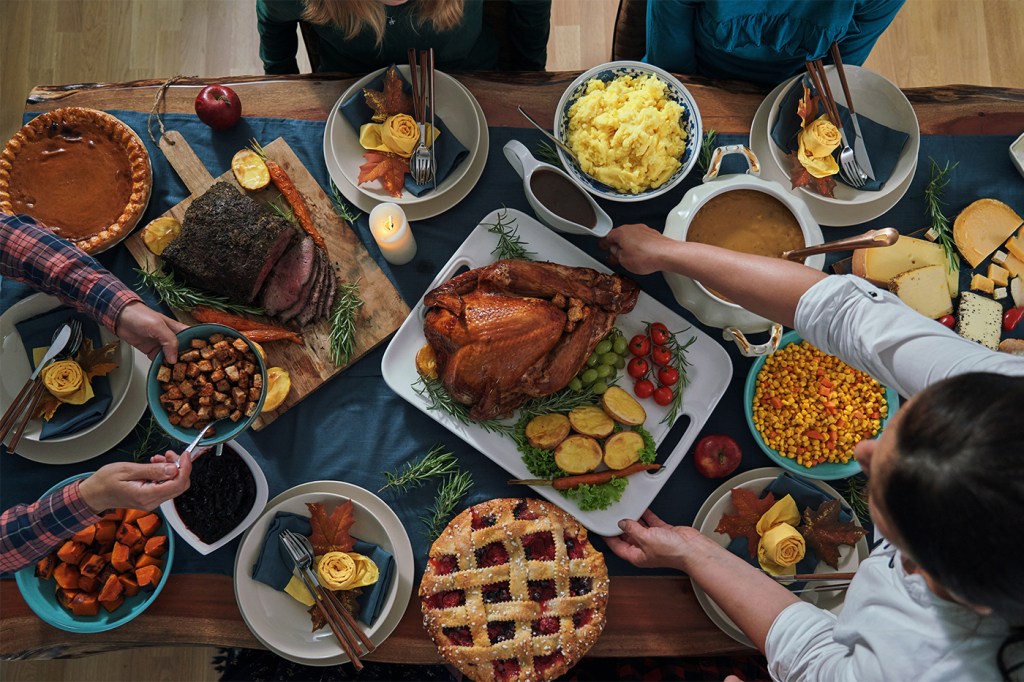Many people are skipping the holidays this year over politics. Here’s what to try instead
You voted one way. A family member may have voted another. Is it worth cutting them off? Laurie Kramer, a professor of applied psychology at Northeastern, weighs in.

Another presidential election season has come and gone in the United States. While every political race has implications for citizens, this particular election could impact people in new ways, whether it be through potential mass deportations or the tariffs President-elect Donald Trump has said he will enact.
The heightened stakes around this election can lead to high emotions.
“The degree of political polarization is really astronomical right now,” said Laurie Kramer, a professor of applied psychology at Northeastern University. “It’s just different than previous elections that we’ve had.”
Kramer said she’s heard from and seen people who are skipping holiday plans with family members who have differing political views. Social media is also active with people considering the same to avoid relatives who voted for a candidate they do not support. One survey shows nearly a quarter of Americans are considering avoiding Thanksgiving with their family over the election.
“It seems to be mostly driven by this kind of polarization,” Kramer said.
She said it’s important to recognize that many people feel harmed by a politician’s ideology.
“I don’t want to forget that piece, because we have people with marginalized identities who … don’t feel accepted by their families,” Kramer said. “In fact, they feel rejected. I’m also hearing that people are saying things like ‘If you don’t believe in my view … I don’t want to be spending time with you as a family member.’ We’re seeing more of that happening nowadays than ever before.”

Is skipping the solution?
But is skipping holidays or cutting off family the solution? Kramer said that in extreme cases where someone’s safety or sanity is at stake, it makes sense.
“If you had asked me six months ago, I would say cutoffs are bad,” Kramer said. “You’re losing a relationship that has the potential to support you. But when we’re talking about family members (who) don’t accept someone’s identity or have been rejecting in some other fashion, you can start to understand that not spending time with those individuals might be important, at least for a period of time.”
Friendships worth saving
For relationships — be it friends or relatives — that are otherwise supportive, those might be worth trying to maintain, she said.
“We know that strong family relationships are gonna help with individual mental health, physical health, all those sorts of things,” Kramer said. “And when we lose one of those relationships for not such a great reason — and I would consider a political polarization not to be such a great reason — that’s an issue.”
Common understanding
Those who are willing to spend time on the holidays with people on the other side of the political aisle need to approach the situation with grace and common understanding that despite different beliefs, there is love present, Kramer said.
“It’s important to try to remember the positive connections that you’ve had in your history together — the good things, the ways that they’ve contributed to each other’s lives in really positive ways — and see if that can help you realize that these disagreements are worth having,” Kramer said.
Ask about perspectives
While these topics can get emotional, Kramer encouraged people to ask about their loved ones’ perspectives and experiences and how that’s contributed to their current beliefs. Rather than listening and talking to try to change the other person’s mind, she said it’s important to listen with the goal of understanding.
Editor’s Picks
Sometimes disagreements can come about the level of impact the election will have on a person’s life. Talking through one’s disagreements and concerns can also help people come to an understanding.
“As a young person to be able to say, ‘I go to work in a neighborhood that sometimes feels unsafe and here’s how that leads me to feel about gun control,’” Kramer said.
Saying things like that can lead to greater understanding, she said.
“If you can understand that and someone can understand you and what makes you feel the way that you do, I think that will lead to more common ground,” Kramer said. “Maybe you’re coming at this issue from different sides, but you might both agree that you care deeply about people’s health and well-being.”
Avoid extreme language
Kramer said it’s also important to avoid judgment and extreme language, like saying the other side is just wrong.
“Avoiding demonizing the other point of view is going to be really important for any kind of conversation,” Kramer said. “If the family is willing to see their loved one as a representative of that group and understand their motivations for thinking that way, maybe that could help.”
People’s minds can change
At the end of the day, it’s impossible to always change a loved one’s mind. But Kramer said it is possible to find ways to maintain your relationships, despite the emotions surrounding the election.
“I really feel for people,” she said. “This is a salient issue. We all have people in our families that see things differently than us. This is just a fact of life. We have to get better at accepting those differences and really asking ourselves why we are so invested in this point of view and talking about that with our family members.”











